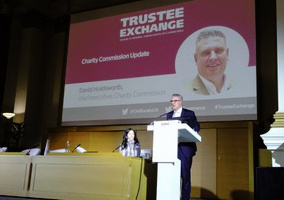As far as I can see, the main argument in favour of maintaining the voluntary principle of trusteeship, put about by the Charity Commission and others, seems to be that paying trustees would negatively impact public trust and confidence in the sector; that it would damage the “social contract” between charities and the donating, volunteering public. But something about this argument doesn’t stack up.
We all know that public perceptions of charities are so far divorced from reality as to be absurd. All of us steeped in the sector have our friends/acquaintances/elderly uncles who love to let rip about the huge salaries/aggressive fundraising/sock-puppet lobbying that characterise charities; either that, or they believe charities are merely the nice hobbies of amateurish do-gooders, and ought to stay that way.
At G&L’s Trustee Exchange event last month, the Charity Commission’s director of communications, Paul Latham, even referenced the regulator’s public trust research from 2023 to reinforce its position: just 20% of respondents said they would be more likely to trust a charity run by paid professionals, while 50% would put greater trust in a charity run by volunteers. Since then, another study from nfpResearch just last month found that only 15% of the public are aware that trustees are accountable for charities.
These sorts of views are genuinely bonkers – not to mention incredibly harmful to sector causes. Of course, there are myriad reasons behind such misguided thinking – a national media that loves to bash charities; deep malevolence toward campaigners on the part of certain politicians; and let’s not forget the flip-flop messaging from successive Charity Commission chairs. William Shawcross was obsessed with rooting out all those charities providing cover for terrorists; Tina Stowell implied constantly that charities were complacent about their privileged status; while Orlando Fraser spoke fondly of the “lovely sector with lovely people doing lovely things”. Er, sorry, what?
Negative public reaction
So that social contract that the commission and others are relying on to preserve the status quo around trustee remuneration is actually based on falsehoods. The great British public has no idea what it really takes to run a modern charity, and so it follows that any “negative public reaction” as warned about in the commission’s new CC11 guidance on paying trustees, is likely to be founded on ignorance.
The Charity Commission has a statutory duty to protect public trust and confidence in the sector. For too long, it has shied away from doing anything to help the public understand charities better, preferring to collude in perpetuating the fictions and fairytales that fuel these damaging public misconceptions.
But enough is enough. The new statistics on board diversity are a wake-up call – things need to change, and widening access to trusteeship by making it easier to pay board members could really help. But first we need a proper, grown-up conversation about how to get the public to engage with the complexities of the sector, and the commission needs to finally step up and play its part in this.
Related articles












